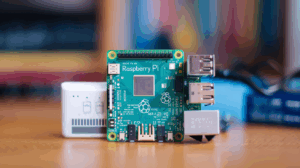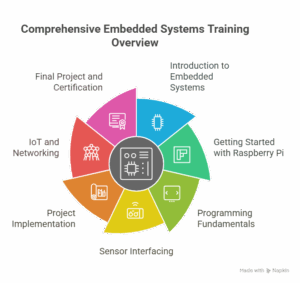
ARM Microcontroller Course: Simple, Structured, and Career-Ready
June 16, 2025
RTOS Certification Course: Build Your Real-Time Embedded System Skill
June 19, 2025In today’s rapidly advancing landscape of embedded systems and IoT, the Raspberry Pi Certification Course stands out as a crucial step toward building a successful career in technology. As industries increasingly rely on automation, edge computing, and smart solutions, the Raspberry Pi has emerged as a versatile, low-cost platform ideal for developing real-time, scalable applications.
Whether you are a student eager to build a strong foundation or a professional looking to reskill for embedded careers, the Raspberry Pi Certification Course provides the technical knowledge and hands-on practice essential to staying competitive in the job market. With its balance of software programming, hardware interfacing, and real-world project development, this course equips learners with end-to-end skills needed in modern embedded development.
At Elysium Embedded School (EES) in Madurai, the Raspberry Pi Certification Course is carefully structured to meet the needs of final year engineering students, electronics enthusiasts, and IT professionals. The curriculum covers everything from GPIO control and sensor integration to IoT connectivity and system design. With project-based learning and industry exposure, students are prepared not only for academic excellence but also for immediate employability.
The Raspberry Pi Certification Course at EES emphasizes practical training, providing access to advanced development kits, lab infrastructure, and expert mentoring. This ensures that learners gain both conceptual clarity and the ability to build real-time applications relevant to current industrial demands.
Table of Contents
Understanding Raspberry Pi and Its Impact on Modern Embedded Systems
The Raspberry Pi is a powerful, cost-effective, and compact computing platform that has revolutionized embedded systems education and prototyping. Originally developed for educational purposes, it has now found widespread adoption in real-world applications due to its flexibility, ease of use, and extensive support for hardware and software integration.
In industrial environments, Raspberry Pi is increasingly used for tasks such as system diagnostics, data acquisition, automation control, and edge computing. Its ability to run a full-fledged Linux OS with access to Python, C, and shell scripting gives developers the freedom to build scalable and efficient embedded applications.
As industries move toward digital transformation and smart technologies, professionals with Raspberry Pi expertise are in high demand. Learning how to build, deploy, and manage systems using Raspberry Pi equips learners with a versatile and future-ready skill set—essential for embedded engineers, IoT developers, and automation specialists alike.
Why Choose a Raspberry Pi Certification Course?
In today’s technology-driven landscape, embedded systems and IoT are critical components of innovation across industries. A structured Raspberry Pi Certification Course provides both the theoretical foundation and hands-on training required to design, build, and deploy embedded applications using a cost-effective platform.
Comprehensive Reasons to Enroll in a Raspberry Pi Certification course:
- Systematic Learning Path
The course is designed to gradually build your expertise—starting with basic computing principles and progressing to complex applications involving sensors, actuators, network integration, and automation. - Hands-On Project Experience
Through lab-based training and guided projects, learners actively work with Raspberry Pi hardware. This practical exposure helps in understanding real-world challenges, system limitations, and debugging techniques. - Real-World Applications Across Key Domains
Raspberry Pi is increasingly used in IoT prototypes, industrial automation, smart agriculture, home control systems, surveillance devices, and even in education tech. The course highlights how to apply knowledge in these domains with relevant use cases. - Industry-Recognized Certification
On successful completion, learners receive a certification from Elysium Embedded School, affirming their technical skills and project capabilities. This adds value to academic records and professional resumes alike. - Internship and Placement Guidance
As part of its commitment to student success, Elysium Embedded School (EES) offers internship opportunities, industry mentorship, and career guidance. Learners gain insights into real-world engineering environments and receive support in finding job opportunities in embedded development, IoT startups, and automation firms.
This certification program is suitable for engineering undergraduates (especially ECE, EEE, CSE), diploma holders, electronics hobbyists, and professionals looking to switch to embedded and IoT-based roles.
Raspberry Pi Certification Course in Madurai – Industry Relevant Training at Elysium Embedded School
Elysium Embedded School, located in Madurai, offers a focused and application-oriented Raspberry Pi Certification Course designed to align with current industry requirements. The curriculum is built by embedded systems experts and is structured to equip learners with a deep understanding of both hardware and software integration.
The Raspberry Pi Certification Course at Elysium Embedded School stands out for its practical approach, enabling learners to work on real-world applications and embedded projects from day one. This Raspberry Pi Certification Course covers essential topics such as GPIO programming, sensor interfacing, Python scripting, and IoT implementation, ensuring students gain hands-on experience. With a strong focus on employability and technical competency, the Raspberry Pi Certification Course is ideal for engineering students, hobbyists, and professionals aiming to build a future in embedded systems.
Course Highlights:
- Hardware and GPIO Interfacing
Learn how to connect and control external devices using Raspberry Pi’s GPIO pins. Practical labs include LED control, motor interfacing, and relay module integration. - Python Programming and Linux OS Fundamentals
Understand the basics of Python as applied to embedded systems. Learn Linux command-line operations, file handling, and shell scripting relevant to device-level control. - Sensor Integration and Data Handling
Work with real-world sensors—temperature, light, humidity, and motion detectors. Gain knowledge on analog-to-digital conversion, signal conditioning, and real-time data monitoring. - Project Design and Implementation
Develop full-fledged embedded projects such as smart home controllers, security systems, automation platforms, and more. Emphasis is placed on problem-solving, code optimization, and documentation. - IoT and Network Communication
Learn to connect Raspberry Pi to the internet or local networks. Use MQTT, HTTP, and cloud platforms for data logging, remote access, and IoT project integration. - Final Evaluation and Certification
Each student completes a final project with documentation, which is assessed for practical viability and innovation. A course completion certificate is awarded upon successful evaluation.
Through its dedicated labs, expert faculty, and student-centric approach, Elysium Embedded School ensures that every participant gains the practical insight and technical fluency needed for real-world embedded system development.
Key Features of the Raspberry Pi Course at Elysium Embedded School:
- Extensive Training on Raspberry Pi 3 and 4 Models
Participants work with the most widely used Raspberry Pi models, ideal for academic, industrial, and research-based applications. - Programming with Python, C, and Shell Scripting
Students gain proficiency in multiple programming languages that are essential for developing embedded applications and automation projects. - Sensor and Module Integration
The course provides practical exposure to connecting and programming a wide range of peripherals, including cameras, GPS, IR sensors, and more. - Real-Time Project Development in IoT and Automation
Trainees build and deploy projects that demonstrate real-world use cases in IoT, smart systems, and process automation. - Linux OS and GPIO Control
Learners receive instruction on configuring the Raspberry Pi operating system, navigating the command line, and managing input/output pins for device control. - Lab-Based Practical Sessions and Hardware Access
Students benefit from structured lab environments that offer access to the latest embedded tools and equipment for real-time implementation.
Raspberry Pi Certification Course at Elysium Embedded School serves as a strong foundation for students, aspiring developers, and working professionals aiming to specialize in embedded technologies and advance their technical careers in the IoT and automation domains.
Raspberry Pi Course for Beginners
For those with no prior experience in embedded systems, the Raspberry Pi course for beginners at EES is designed to be intuitive and engaging. The course introduces fundamental computing concepts and walks students through setting up their Raspberry Pi, understanding Linux OS, and writing their first code using Python.
Topics Covered for Beginners:
- Introduction to Raspberry Pi hardware and setup
- Understanding the Linux command line
- Basic programming in Python
- Using GPIO pins to interact with LEDs and sensors
- Building your first project: Home automation, line follower, or temperature sensor
The beginner modules are supported with visuals, step-by-step guides, and instructor-led practical sessions to ensure learners build a strong foundation.
Raspberry Pi Training Syllabus – What Will You Learn?
The Raspberry Pi training syllabus at Elysium Embedded School is meticulously crafted to offer both theoretical grounding and immersive practical training. This comprehensive curriculum is suited for students, engineering graduates, hobbyists, and professionals who want to gain industry-ready skills in embedded systems and IoT development.
Detailed Syllabus Outline:
Introduction to Embedded Systems
- Understanding the architecture of microprocessors and microcontrollers
- Fundamentals of embedded systems design
- Key differences between traditional microcontroller platforms (like Arduino) and Raspberry Pi
- Overview of real-time systems and their applications
Getting Started with Raspberry Pi
- Introduction to Raspberry Pi: Model A, B, 3B+, 4, and Zero W
- Understanding the board layout, components, and features
- Installation of Raspbian OS (Raspberry Pi OS) using NOOBS and image files
- Exploring the Linux file system and directory structure
- Basic terminal commands and shell navigation
Programming Fundamentals
- Introduction to Python: syntax, variables, control structures, functions
- Writing and executing Python scripts for Raspberry Pi
- GPIO basics: setting up pins as input/output
- Implementing LED blinking, push-button controls, buzzer operation, DC motor control
- Introduction to C and Shell scripting for advanced control
Sensor Interfacing
- Interfacing digital sensors (IR, motion, ultrasonic)
- Working with analog sensors using ADC converters (MCP3008)
- Reading and processing data from temperature (DHT11/DHT22), humidity, LDR, and PIR sensors
- Implementing real-time sensor data display on terminal or LCD
Project Implementation
- Designing mini-projects for practical understanding:
- Smart lighting and automation system
- Automated garden watering system using soil moisture sensors
- Real-time clock-based home appliance controller
- Integrating Pi camera for surveillance and image capturing applications
- Using GPIO with relays for controlling external electrical devices
IoT and Networking
- Introduction to networking concepts: IP, MAC, SSH, and VNC
- Connecting Raspberry Pi to Wi-Fi and configuring remote access
- Basics of MQTT protocol and cloud communication
- Sending sensor data to cloud platforms like Thingspeak, Firebase, or Blynk
- Building remote monitoring systems with live data access via mobile or web dashboard
Final Project and Certification
- Selection of an industry-relevant final project topic
- Project planning, circuit design, coding, and implementation
- Documentation and code review with instructors
- Final evaluation based on innovation, functionality, and presentation
- Course completion certificate issued by Elysium Embedded School with performance grading
This detailed syllabus ensures that learners develop the technical skills and project experience required to enter the embedded systems and IoT job market with confidence. Every module is taught using a hands-on approach, supported by lab access, personalized mentoring, and real-world project exposure.
Raspberry Pi Course for Final Year Students – Practical Training for Academic and Career Growth
Final year engineering students often face the challenge of translating theoretical knowledge into practical, impactful projects. The Raspberry Pi course for final year students at Elysium Embedded School (EES) is specifically designed to support this critical transition. It provides students with hands-on experience in designing, building, and presenting projects that are both academically impressive and aligned with current industry standards.
Key Benefits for Final Year Students:
- Project Selection and Personalized Mentoring
Get guidance in choosing innovative project topics tailored to your interests and academic requirements, with support from experienced trainers throughout development. - Real-Time Development Environment
Gain exposure to development practices that mirror industry scenarios, including debugging, version control, and modular system design. - Support for IEEE and Domain-Specific Projects
Build projects based on IEEE standards, integrating modern technologies like IoT, automation, and remote monitoring for academic excellence and research relevance. - Value-Added Certification
Upon course completion, receive a recognized certification that enhances your academic profile and makes your resume stand out during campus placements or higher education admissions. - Internship and Placement Opportunities
EES offers internship programs and placement assistance through its established industry network, giving students a head start in their careers.
In addition, students benefit from soft skills development, resume-building workshops, and interview preparation sessions, equipping them for both technical and HR rounds of recruitment.
Raspberry Pi Embedded Systems Training – Bridging Academia and Industry
The Raspberry Pi embedded systems training at EES goes far beyond basic programming. It immerses students in the fundamentals and practical applications of embedded system design using Raspberry Pi—a skillset increasingly in demand across sectors like manufacturing, healthcare, automotive, smart agriculture, and more.
What You Will Gain from This Training:
- Fundamental Knowledge of Embedded Systems Architecture
Learn how microcontroller-based systems operate, and how Raspberry Pi differs in terms of computing power, GPIO flexibility, and application scope. - Sensor Integration and Data-Driven Logic
Work with real-world sensors to implement decision-making logic, such as temperature-based automation, motion detection, and wireless control systems. - Real-World Problem Solving
Apply engineering principles to develop solutions to practical challenges, from environmental monitoring to industrial process automation. - Design of Scalable and Portable Systems
Understand how to design energy-efficient, cost-effective, and scalable embedded solutions that are suitable for mass deployment.
This training program aligns with the skill requirements of embedded systems and IoT companies. By the end of the course, students will not only be capable of building and presenting academic projects, but also be ready to contribute effectively in an industrial environment from day one.
Career Opportunities After Certification
Once certified, learners can pursue careers in roles such as:
- Embedded Systems Engineer
- IoT Developer
- Robotics Programmer
- Embedded Python Developer
- Automation Engineer
- Research and Development Associate
With a strong resume that includes Raspberry Pi project experience and certification from a recognized institute like EES, candidates can stand out in competitive technical job markets.
Frequently Asked Questions (FAQs)
- Who is eligible to enroll in the Raspberry Pi Certification Course offered by Elysium Embedded School?
The course is open to anyone with a passion for embedded systems, electronics, or IoT technology. It is particularly suitable for engineering students specializing in ECE, EEE, and CSE, as well as diploma holders, hobbyists, and working professionals who are eager to upskill in embedded technologies. - Is prior programming experience required before joining the course at Elysium Embedded School?
Not at all. The Raspberry Pi Certification Course at Elysium Embedded School is thoughtfully designed to accommodate both beginners and those with basic technical knowledge. The curriculum starts with fundamental concepts and gradually progresses to more advanced topics, ensuring a smooth learning curve for all participants. - What types of hands-on projects will I work on during the Raspberry Pi Certification Course?
Learners at Elysium Embedded School will engage in a variety of practical projects that include smart home automation, IoT-based surveillance systems, real-time data logging, environmental monitoring, and robotics applications. Final year students also receive guidance on developing IEEE-based academic projects with real-world relevance. - Will I receive a certification after completing the course at Elysium Embedded School?
Yes. Upon successfully completing the training modules and final project evaluation, participants will be awarded a prestigious certification from Elysium Embedded School, validating their expertise and hands-on experience with Raspberry Pi and embedded systems. - Does Elysium Embedded School provide placement assistance after course completion?
Absolutely. Elysium Embedded School offers dedicated placement support and internship opportunities through its strong industry connections and alumni network. Qualified students benefit from resume building, interview training, and referrals to top embedded and IoT companies.
Conclusion
The Raspberry Pi Certification Course offered by Elysium Embedded School in Madurai is more than just a technical training program—it serves as a complete learning pathway designed to bridge the gap between academic knowledge and industry expectations. This course is ideal for beginners, engineering students, and professionals who aspire to build a strong foundation in embedded systems and IoT technologies.
By enrolling in the Raspberry Pi Certification Course, learners gain access to structured instruction, lab-based learning, and real-time project experience. The curriculum emphasizes both conceptual clarity and hands-on application, ensuring participants are well-prepared to tackle real-world challenges in automation, hardware integration, and smart system design.
What sets this Raspberry Pi Certification Course apart is its focus on holistic skill development—covering everything from Linux environments and Python scripting to sensor interfacing and IoT connectivity. Students benefit from expert mentoring, modern lab facilities, and the guidance of an institution committed to excellence in embedded education.
Whether you’re looking to enhance your technical profile, prepare for final-year academic projects, or transition into an embedded systems role, this Raspberry Pi Certification Course provides the tools and training you need to succeed. With strong placement assistance and a focus on employability, Elysium Embedded School stands out as a trusted destination for embedded systems training in Madurai.













